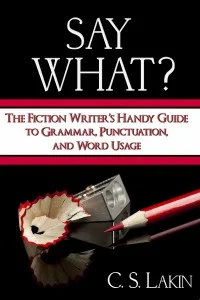Professional copyeditor and writing coach Susanne Lakin explains how learning the rules of grammar will improve the fortunes of self-published authors, creatively as well as financially. She makes particular reference to grammar in fiction writing, the focus of her latest book, “Say What?”
Writers know they have to learn grammar. At least some grammar. Back in the day, the only hope of publication for writers was to get their novel picked up by a traditional publisher. And back then, little to no emphasis was ever put on the need for a writer to learn grammar, self-edit, polish his manuscript, or hire a professional copyeditor. There were in-house editing teams waiting to do the unpleasant task of cleaning up the undoubtedly messy manuscript.
But in this new era of self-publishing, which also sees severe competition for the few slots in a big publishing house’s catalogue, writers are expected to present perfectly edited manuscripts. Those who submit error-ridden novels to agents or publishers are often rejected without hesitation. Those who self-publish books full of mistakes get dinged by negative reviews.
Why Self-published Authors Should Learn Grammar
But why should a writer take all that time to learn yucky grammar? Who really needs to know what a predicate or participle is? Can’t writers just learn to write well by reading well-written books? Maybe you are thinking it’s worth the money to give someone else that unpleasant task of cleaning up your mess.
Although one can certainly defer all that tedious grammar correction to a professional editor for hire, the more a writer learns to write well, the better off she will be – financially and creatively. Not knowing how to correctly structure sentences is a liability.
My eighth-grade English teacher repeatedly pounded his students on the head with this aphorism: “Say what you mean. Don’t say what you don’t mean.” When writers lack knowledge of correct grammar, punctuation, spelling, and word usage, they often end up saying what they don’t mean. Which is counterproductive and often wastes time.
Are There “Rules” for Fiction Writing?
In my work as a full-time copyeditor and writing coach, I critique and edit more than two hundred partial or complete manuscripts a year, from clients in six continents. That’s a lot of diverse writing I examine, in just about every genre. But although these works are very different from each other, I see time and again many of the same grammar and sentence structure mistakes. The same words appear again and again misspelled or misused.
Not all questions about grammar are simple, and often there are grey areas and situations that are matters of style. This becomes an even greater component when dealing with fiction, which introduces elements of characterization, regional speech, and creative writing style.
Most writers want to “follow the rules” of grammar, yet don’t want their style encroached upon. However, the more a fiction writer knows and understands the rules of grammar, the better equipped she will be to write well – and to make sound decisions regarding when or if to break the “rules.”
Aside from the obvious reason for becoming a proficient handler of language (you’re a writer, after all, and language is the tool of your craft), learning grammar will make your job easier and your writing much better in the long run. And those are goals, it seems, most writers would embrace and strive for.
Susanne's guide to grammar for fiction writers, Say What?, is now available to order. More details are available on her LiveWriteThrive website.
What's your attitude to grammar? Please feel free to leave a comment and join in the conversation!






“At least some grammar”, and “Which is counterproductive and often wastes time”, are not complete sentences. It is incorrect grammar to begin a paragraph or sentence with conjunctions “and” or “but”. You incorrectly hyphenate simple words such as eighth grade, well written, and full time, instead of searching for more descriptive terminology. “Get dinged” is all you could think of? Do they lose credibility? “She will be – financially and creatively”, is incorrect punctuation, and excludes men. “Don’t say what you don’t mean”, is highlighted by the poor sentence structure and lack of punctuation in the sentence, “The same words appear again and again misspelled or misused”. “And those are goals… strive for”, begins with a conjunction and ends with a dangling participle.
Susie, you may be a coach, but you are not a professional level editor. Repeatedly using the adverbs, “often, it seems, many, most, much better, time and again, again and again, greater, and better off”, describes your opinion. There is no substance in your article.
[…] Writing: The Grammar Principle – with C S Lakin […]
I strongly believe writers should learn grammar. I gained so much from this article. Its not just learning how to self publish, its all about putting out a good book into the market. Learning Grammar will surely help
[…] writer should know there way around grammar. It is a cold hard fact of a writer’s life that they know how to use a comma, what makes a proper […]
Learning grammar will also make the editor’s job that much easier and get the book published. Also, be sure BRAIN is engaged before putting fingers to keyboard. 🙂
Renowned for New Zealand’s young hope, Rosie White becomes all-time top scorer scoring
seven goals in heer last 15. The countries that will be getting their hands on the
Xbox One on this date are Australia, Austria, Brazil, Canada, France,
Germany, Ireland, Italy, Mexico, New Zealand, Spain,
United Kingdom, and the United States. Brings in a small
income, although the method is fun aand easy.
Feel free to visit my weblog – fifa cheats
[…] Writing the grammar principle with C S Lakin […]
I think writers should definitely continue to develop better grammar skills. I’m not perfect, but it drives me crazy to see spelling, grammar, or punctuation errors in any written piece. That’s why it’s so important to read over what you’ve written before calling it complete. This goes for emails, etc as well. Of course autocorrect is the bane of any writer. Thanks for the post.
Utterly agree re books.
However, am very dyslexic-ish and prone to typos in e-mails, would need to use a copy-editor! So shall have to make sure I do not send one of my horrible ones to you!!
It drives you crazy to see spelling, grammar, and punctuation errors, right? It is all of them not just one.
This goes for emails, etc., as well. Name two items before using etc., and use correct punctuation.
Bane is another word for curse or nuisance. Why would auto correct be a nuisance?
Why did you thank yourself for the post? Is this Susie posting for her own article?
Hi C.S: Thank you for the excellent discussion. I keep several reference books on Writing Well at my hand to research my questions regarding grammatical structure. I re-write and polish so many times that I lose track of the number of drafts and tweaks and polishes. I am never 100% satisfied. However, I do reach a point where I can’t improve the scripts. That’s when I seek copy reviews from the pros. I provide each of my characters with a special trait that labels their voices as different from one another. This at times requires language that is colloquial; not usually correct grammar when I am translating into English, and maintaining the character’s accent. I will check out your book on Amazon.
Best wishes for your success.
Warren.
I see the first comment mentions the ‘Oxford Comma!’ (Smile!) That’s a useful comma, and not to be despised…
Yeah, well, I totally agree with all this grammar stuff: I am superbly blessed to have a partner who is a grammar-freak – and who enjoys my work enough to be my grammar-eyes. It’s part of his day job as a dictionary editor… I’m almost becoming an editor myself with the pencil poised and commenting on the weird and wonderful sentences (‘her eyes rested momentarily on his feet’) you sometimes fall over in published novels…
Actually we have a lot of fun with the possibilities of ‘bad’ grammar, and how it can take charge of what you write. We also love the headlines on the BBC News page (and elsewhere), which (?unintentionally) offer endless fun with words and meanings… such as (I’m making this one up) ‘NHS inquiry committee suspended in drugs police probe’
Go, grammar, say I! (Who was really foxed by it all, at school, but thankfully at least absorbed its basic usage from some good teachers.)
I have to say I am delighted to see the book’s title contains an Oxford Comma.